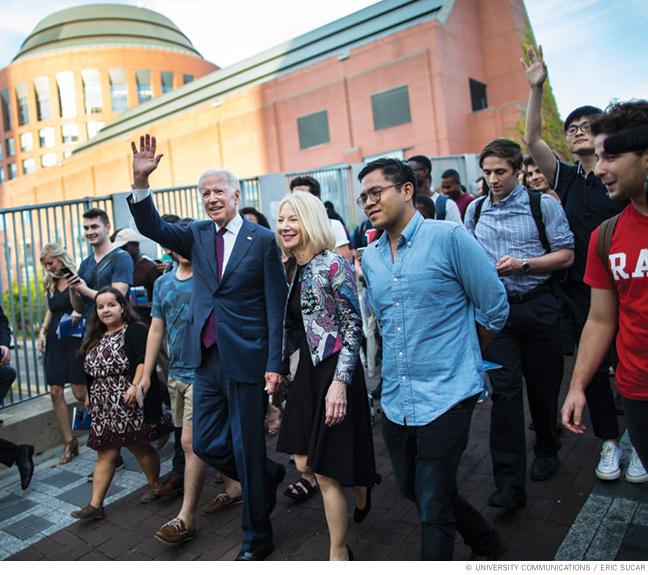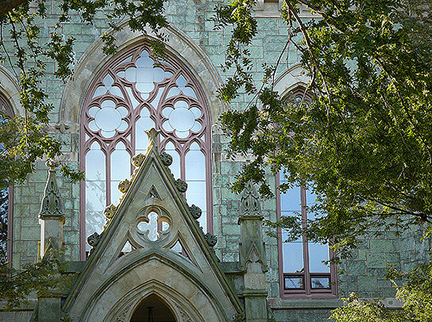
The White House has tapped Penn’s president and former trustees chair for senior diplomatic posts.
In early July it was announced that Penn President Amy Gutmann had been nominated to serve as the US ambassador to Germany by President Joe Biden Hon’13, and a few weeks later the news came that David L. Cohen L’81 Hon’21 was the administration’s pick for US ambassador to Canada.
Before defeating Donald Trump W’68 in the 2020 presidential election, Biden served as the Benjamin Franklin Presidential Practice Professor and led the Penn Biden Center for Diplomacy and Global Engagement. Family members including his late son, Beau Biden C’91, and daughter, Ashley Biden SPP’10, hold Penn degrees, and Biden had been a regular visitor to campus over his years in the US Senate and as vice president, including serving as Commencement speaker in 2013.
Cohen recently concluded a 12-year term as chair of the University’s board of trustees. Gutmann has been Penn’s president since July 1, 2004. Her contract was extended multiple times, most recently through June 30, 2022, but now her remaining time in College Hall will depend on when Senate hearings on the nomination are scheduled and her appointment is confirmed.
“I cannot overstate what a meaningful and extraordinary honor it is to be nominated by the President for this important position of service to our country,” Gutmann said in a statement to the University community on July 2 when the nomination was announced, confirming a report first published a few days earlier in Der Spiegel. “As the daughter of a German Jewish refugee, as a first-generation college graduate, and as a university leader devoted to advancing constitutional democracy, I am grateful beyond what any words can adequately express to President Biden for the faith he has placed in me to help represent America’s values and interests to one of our closest and most important European allies.”
Gutmann expressed confidence that the search for her successor and the transition to new leadership would go smoothly. “We have a most dedicated and talented leadership team and Board of Trustees that are altogether unsurpassed in higher education,” she said, “so there is every reason to be confident that the operations of our University will proceed apace without any interruptions.”
Virtually every aspect of those operations has been shaped by Gutmann’s consequential presidency, the longest in Penn’s history. At her inauguration in fall 2004, she laid out the Penn Compact, setting out the University’s key principles “to increase access, to integrate knowledge, and to engage locally and globally.” Tweaked and modified in expression along the way, those principles continue to guide the University’s efforts, with an emphasis on the overarching goals of inclusion, innovation, and impact.
Gutmann has led two highly successful fundraising campaigns, the $4.3 billion Making History [“Big Finish, Fresh Start,” Mar|Apr 2013] and the recently concluded Power of Penn (for which totals have not been announced but are likely to exceed the initial goal of $4.1 billion). The University accomplished this despite the worst financial crisis since the Great Depression happening in the course of the first campaign, and a deadly pandemic sweeping the world during the second one.
Starting in 2009, Gutmann established Penn’s all-grant financial aid program, the largest in higher education, and has expanded support and programs for first-generation, low-income college students during her tenure. The Penn Integrates Knowledge (PIK) Professorships, which involve appointments to departments in multiple schools at Penn, and other endowed professorship programs have strengthened the University’s ability to attract and retain the best teachers and scholars to the faculty.
And the University’s physical plant has been transformed under her leadership, from the athletic facilities and green space of Penn Park to the newly opened New College House at 40th Street (along with Lauder College House, which opened in 2016, the first new student residences to be built on campus since the 1970s), and to the Pennovation Center startup incubator, the health system’s Pavilion for patient care, and numerous academic buildings and renovation projects. (Look for a full retrospective of Gutmann’s tenure in a future issue.)
In her July 2 statement, Gutmann noted that hearings on the nomination had not yet been scheduled (still the case as the Gazette goes to press) and promised to “continue to avidly work as Penn President” until she served out her term next June or was confirmed. “I remain absolutely energized and engaged in leading Penn with an unrivaled leadership team and community of faculty, students, staff, and alumni,” she said. “The Penn community has shown its true mettle more than ever this year, and to great effect for our city and Commonwealth, country and world.”
Looking ahead to “our joyful return to on-campus operations” in the fall, Gutmann emphasized that she remains dedicated to furthering the University’s mission of “research, teaching, patient care, and civic service” and making Penn “a more impactful, innovative, and inclusive institution—and that certainly does not change with my nomination.” —JP




